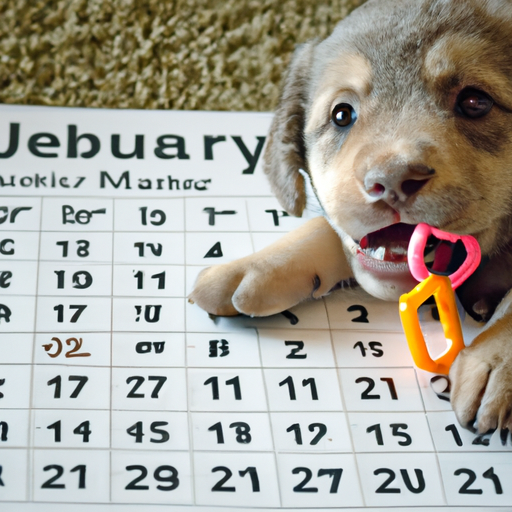As a caregiver, understanding the teething process of your furry friend is crucial. Just like human babies, puppies also go through a teething process, which can be a tough time for them. This guide will provide you with comprehensive information about dogs’ teething age, signs, and how to ease their pain.
Understanding Dogs Teething Age
Puppies start teething at around 3 weeks old. At this stage, their first set of baby teeth, also known as deciduous teeth, start to emerge. By 6 weeks, most puppies have their full set of baby teeth. Adult teeth start to come in around 12 weeks, and by the time they are 6 months old, most dogs have all 42 of their adult teeth.
- 3 weeks: Start of teething
- 6 weeks: Full set of baby teeth
- 12 weeks: Start of adult teeth
- 6 months: Full set of adult teeth
Recognizing the Signs of Teething
Puppies typically exhibit several signs when they are teething. Here are the most common ones:
- Increased chewing: Puppies chew more during this period to alleviate the discomfort.
- Drooling: You may notice more drool than usual.
- Missing teeth: Baby teeth will start to fall out to make room for adult teeth.
- Bleeding gums: This can happen when the new teeth are breaking through.
- Inappetence: Teething pain can cause your puppy to lose their appetite.
How to Ease Teething Pain
Teething can be painful for your puppy. However, there are several things you can do to help ease their discomfort:
- Chew Toys: Provide a variety of chew toys. These can help soothe your puppy’s sore gums and also keep them from chewing on your furniture.
- Cold Treats: Frozen carrots or ice cubes can help numb your puppy’s gums and provide relief from the pain.
- Puppy Teething Gel: There are special teething gels available for puppies that can help alleviate the pain.
What Not to Do During Teething
While it’s important to ease your puppy’s teething pain, there are a few things you should avoid:
- Don’t ignore excessive discomfort or distress.
- Don’t punish your puppy for chewing.
- Don’t use human teething gels as they can be toxic to dogs.
Dental Care for Your Teething Puppy
Proper dental care is crucial even during the teething stage. Here is a simple dental care routine for your puppy:
- Brushing: Start brushing your puppy’s teeth at a young age to get them used to it.
- Regular Check-ups: Schedule regular dental check-ups with your vet.
- Healthy Diet: Provide a balanced diet to ensure healthy teeth and gums.
Dogs’ Teeth and Age
Here’s a simple table to understand your dog’s teeth and age relation:
| Age | Teeth |
|---|---|
| 3 Weeks | Begin Teething |
| 6 Weeks | Full Baby Teeth |
| 12 Weeks | Begin Adult Teeth |
| 6 Months | Full Adult Teeth |
FAQ’s
1. Can teething cause diarrhea in puppies?
While it’s not common, some puppies may have soft stool or diarrhea from the teething process.
2. How long does teething last?
Teething in puppies begins at about 3 weeks and lasts until they’re about 6 months old.
3. When do puppies stop biting everything?
Puppies usually stop biting everything once they have all their adult teeth, around 6 months of age.
4. Is puppy teething pain severe?
The severity of teething pain varies from puppy to puppy. While some might seem unfazed, others may appear distressed. If you’re worried, consult your vet.
5. Can I still brush my puppy’s teeth while they’re teething?
Yes, but be gentle. It’s important to keep their mouth clean to prevent any infections.
Remember, every puppy experiences teething differently. As a caregiver, your role is to provide them with comfort and care during this time. With patience and understanding, you can help your puppy navigate through their teething phase with ease.



